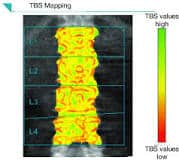This is a follow-up to the blog I wrote several months ago about trabecular bone score (TBS).
This relatively new technology is a complement to bone density (DXA) exams and gives information about the quality of bone. (DXA only assesses bone quantity.) TBS gives us a texture image of the spine microarchitecture and is especially useful when assessing bone loss from conditions that cause increased cortical porosity and compromised bone microarchitecture (such as that seen in diabetes, hyperparathyroidism, chronic kidney disease, ankylosing spondylitis, rheumatoid arthritis, etc.) In fact, TBS is more sensitive than bone mineral density T-scores

A TBS is obtained through post-acquisition processing of DXA exams. Unfortunately, at the
current time, TBS is not available at most DXA facilities but this is changing. TBS technology is taking traction fast and hopefully it will soon become available at your home-town DXA facility.
Here is the link to see if your DXA facility has TBS capability: https://www.medimapsgroup.com/find-a-clinic-with-tbs/
* Lin YC., et al. 2019. J Clin Densitometry
** FRAX is a tool that you can use to assess your fracture risk. Here is the link: https://www.sheffield.ac.uk/FRAX/

